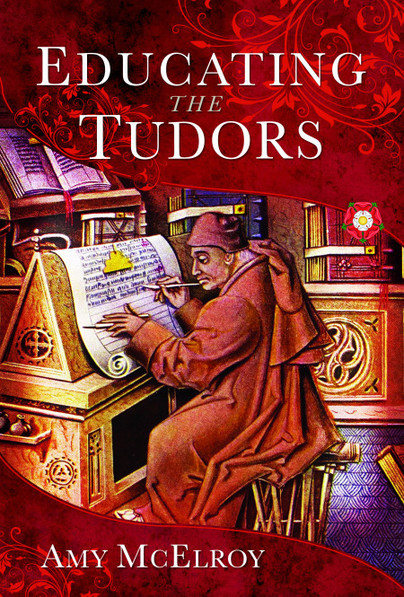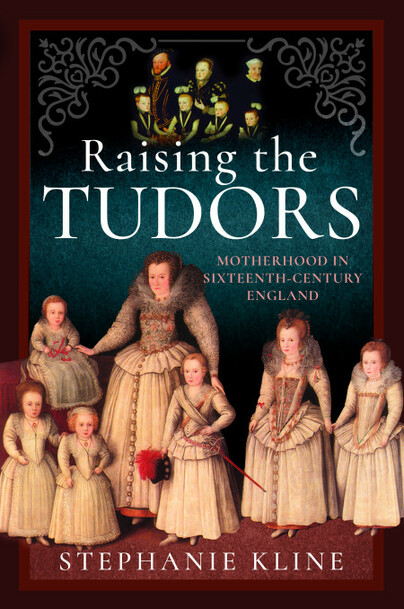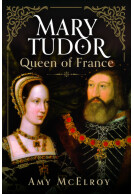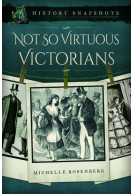Educating the Tudors (Hardback)
Imprint: Pen & Sword History
Pages: 216
Illustrations: 20 mono
ISBN: 9781399095969
Published: 16th January 2023
Star Review!
"Combining readability with comprehensive research, and written with passion and style, Educating the Tudors will undoubtedly be required reading for anyone with an interest in the period. Veterans of the dynasty and those interested in the social development of learning will be enchanted." - Stephen Veerapen
(click here for international delivery rates)
Need a currency converter? Check XE.com for live rates
| Other formats available - Buy the Hardback and get the eBook for £1.99! | Price |
|---|---|
| Educating the Tudors ePub (12.0 MB) Add to Basket | £6.99 |
Education during the Tudor era was a privilege and took many forms including schools, colleges and apprenticeships. Those responsible for delivering education came from a variety of backgrounds from the humble parish priest to the most famed poet-laureates of the day. Curriculums varied according to wealth, gender and geography. The wealthy could afford the very best of tutors and could study as much or as little as they chose whilst the poorer members of society could only grasp at opportunities in the hopes of providing themselves with a better future.
The Tudors were educated during a time when the Renaissance was sweeping across Europe and Henry VIII became known as a Renaissance Prince but what did his education consist of? Who were his tutors? How did his education differ to that of his elder brother, Prince Arthur and how did Henry’s education change upon the death of his brother? There is no doubt Henry was provided with an excellent education, particularly in comparison to his sisters, Margaret and Mary. Henry’s own education would go on to influence his decisions of tutors for his own children. Who had the privilege of teaching Henry’s children and did they dare to use corporal punishment?
Educating the Tudors seeks to answer all of these questions, delving into the education of all classes, the subjects they studied, educational establishment and those who taught them.
This was something more unique to the bundles of Tudor history books we usually see, and I think that makes it stand out amongst some of the rest.
Life & Tea
Read the Full Review Here
As featured on Tudor Blogger
Tudor Blogger
A really interesting and thorough book that would really appeal to those in the educational world.
The History Fella
Read the Full Review Here
As featured by The Tudor Times
The Tudor Times
I found it well researched and informative.
NetGalley, Anna Maria Giacomasso
Recommended.
Rating: 5 out of 5 stars
NetGalley, Heidi Malagisi
When we think of the word “education,” images of sitting in school rooms for hours, listening to lectures, and doing endless homework pop into our minds. Our modern education system tends to focus on math, science, language arts, and history as the core subjects we study, with music and physical education as something that we in America call an “elective.” But have you ever wondered what education looked like in the past? How did the Tudors pass on their knowledge to future generations? What subjects did the Tudors consider essential, and how did the amount of education you received change depending on your class? Amy McElroy explores these questions in her book, “Educating the Tudors.”
Thank you, Pen and Sword Books and Net Galley, for sending me a copy of this book. When I heard about this book, it grabbed my attention because although many books about the Tudors have talked about elements of education, I have yet to see a book about Tudor education. I was curious to see how the rise of humanism would affect Tudor education throughout the 16th- century.
Before we dive into the differences in classes regarding education, McElroy gives her readers a breakdown of the different types of schools and what subjects each school teaches, including the trivium and quadrivium. She then dives into the Tudor monarchs and their education, starting with King Henry VIII, the first monarch in England to receive a humanist education. With royal children and their education, we are introduced to their royal tutors, like Giles Duwes, Bernard Andre, John Palsgrave, Roger Ascham, Desiderius Erasmus, and John Picton.
McElroy takes her readers on an educational journey through the different social classes, like nobility, gentry, and knights, to the common people. As she points out, the lower you get on the social ladder, the less critical education is to have a career. With the introduction of the printing press and the Reformation, the way students were taught and discussed religious issues changed throughout the 16th century. I loved learning about the popular books of the time, the different instruments and dances that were enjoyed, and what games were played during down times.
For McElroy’s first book, I found it very educational, informative, and easy to read. Her passion for humanism and the evolution of Tudor education exudes on each page. I took pages of notes about this book, and I learned so much from this debut. I cannot wait to see what Amy McElroy will write about next. To learn more about how the Tudors approached education and humanism, you should check out “Educating the Tudors” by Amy McElroy.
When reading biographies about historical figures, such as Henry VIII, there is generally an overview of their education. But, due to the sheer amount of information included in biographies, readers aren't able to take a deep dive into the details about what education during the Tudor era actually involved. Educating the Tudors by Amy McElroy delves into this topic in her first book, due out in January 2023. A huge thank you to NetGalley and Pen and Sword Books for access to this book.
NetGalley, Lucy Menadue
As identified by McElroy in the introduction, the Tudor period saw a shift in education. In Medieval England, education was for 'men of the church.' But, both the Renaissance and Reformation affected education during the Tudor reign. Humanism was a major part of this shift during the Renaissance. As there is today, over time, there were changes in the curriculum. Humanists would study topics such as 'grammar, rhetoric, philosophy, and history.' Royal children were taught a wide-ranging curriculum, encompassing, for example, prayers, greetings, and the appropriate protocol for the giving and receiving of gifts as well as a wide variety of languages. The type of education received varied, depending on social class, and whether the individual was male or female. We are also introduced to the different extra-curricular activities that Tudor people took part in - from bear baiting and embroidery to cock-fighting and hunting.
Overall, this book was easy to read and enjoyable. I found it incredibly interesting to learn more about humanist education, and the specific topics that would have been covered. It was also fabulous to learn more about well known figures from Tudor history such as Desiderius Erasmus, John Skelton and John Cheke. I also learnt about some of the lesser known people from Tudor history. If you have an interest in Tudor history, or the history of education, then I recommend reading Educating the Tudors by Amy McElroy.
A deeper dive into the aspect of education in the Tudor world. Recommended for the serious researcher or student, as this book takes a close look at all aspects of education and the influence that wealth, or lack thereof, had in providing opportunities. For those interested in the Tudor time period, this is a must-read.
NetGalley, Spencer Wright
...a really well-written and thoroughly researched text on education in all its forms. Highly recommended!
Sarah J Hodder
Rating: 5 out of 5 stars
NetGalley, M J Porter
Educating the Tudors by Amy McElroy is a fascinating and thorough examination of the state of education for all during the Tudor era, following developments due to the Renaissance and the Reformation, as well as the introduction of the printing press. Not content with researching the tutors of the royal children from Arthur to Edward, Amy has also examined education for all levels of society as well as what would have been taught. With an eye for the difference between class, sex and wealth, Amy has examined what education was, and how it was undertaken, as well as the titans who were making use of their interest in learning to advance learning for all, making use of the printing press, even as they sought to catch the eye of the reigning monarch.
And this isn't just book-learning, but also the paths of apprenticeships, as well as how people became lawyers, and just what effect the Reformation did have on an education system that was so heavily reliant on priests and had to be radically rethought when the monasteries, and later, chantries were closed.
I was fascinated by the subject matter, and learned so much from reading this book - indeed, even things I've read about before suddenly made a lot more sense.
An absorbing and well-researched book, which is sure to fascinate all those interested in the Tudors, as well as the development of education in England.
(I found the subject matter absolutely fascinating, especially as I've personally been researching the education of the children of King Alfred. I was struck by the similarities, despite the six hundred plus year distance between the two eras. I'm sure I won't be alone in that - I hope:) And there's a another link between the Tudors and the Saxons, as it was the renewed interest in learning that is responsible for many of the surviving Saxon text we now have, including the Anglo-Saxon Chronicle.)
Rating: 5 out of 5 stars
NetGalley, Kathryn McLeer
This was a interesting concept, I really never thought of educating the Tudors. It was what I was hoping for and was written in the way I was hoping for. I was never bored when I read this and was glad I was able to read this. Amy McElroy has a great writing style and am glad I was able to read this.
‘The conduct of the royal children would have been watched at all times to ensure their manners were impeccable, even at mealtimes their behaviour and table manners would have been observed and corrected if their etiquette was not up to standard.’
Georgi Lvs Books !!
This was a really interesting read. The subjects to study were defiantly a lot more interesting back then but my gosh, they seemed intense!
And the hours for school? Holy sh*t!
‘The syllabus instructed Mary to grasp the eight parts of speech: noun, pronoun, verb, adjective, adverb, preposition, conjunction and interjection.’
I fell in love with learning more about Katharine of Aragon and her believes as a woman/queen.
It’s funny how I mentioned earlier that the education for children was quite intense but when it came to becoming a doctor, sometimes just reading some literature on the topic was enough!
A must read for Tudor lovers and people interested in learning about education.
About Amy McElroy
Amy was born and bred in Liverpool before moving to the Midlands to study Criminal Justice eventually becoming a civil servant. She has long been interested in history, reading as much and as often as she could. Her writing journey began with her blog, sharing thoughts on books she had read, before developing to writing reviews for Aspects of History magazine and culminating in her own book.
Raising the Tudors Motherhood in Sixteenth-Century England (Hardback)
For the vast majority of women in sixteenth-century England, motherhood was more than a choice. To become a mother was a duty to one’s husband, an expectation by society, and a defining facet of her femininity and value to the world in which she lived. In a time when nearly all women were expected and encouraged to have children, and raise them according to strict religious and societal standards, the role of motherhood was arguably one of the most important and discussed topics by females of the Tudor period. Many of them spent half their lives conceiving, bearing, and raising children –…
By Stephanie KlineClick here to buy both titles for £29.40


















